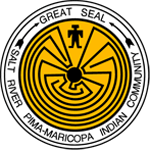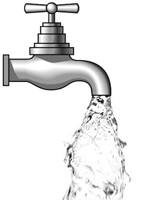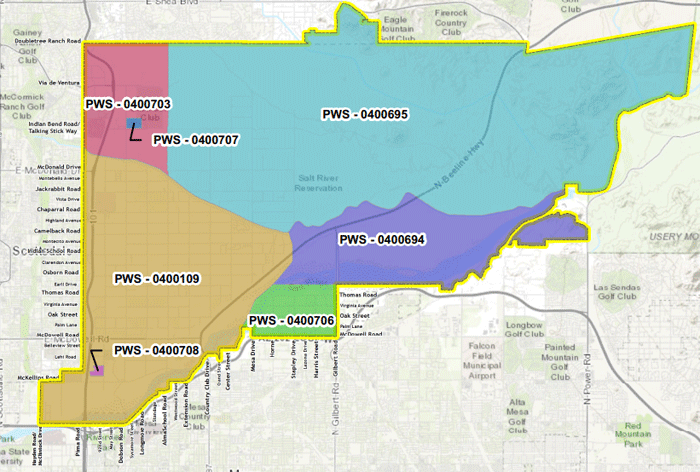Your Drinking Water
Water Quality Reports


The Salt River Pima-Maricopa Indian Community (Community) is committed to providing a safe and highest quality drinking water, which meets or exceeds all standards for water quality monitoring requirements, set by U.S. Environmental Protection Agency (EPA). Community is required under the Safe Drinking Water Act (SDWA) to monitor for potential chemical and biological contaminants to ensure that we are providing clean drinking water to the Community. The water quality is ensured through a series of chemical and bacteriological tests and measurements conducted throughout the year.
Federal law requires that once a year suppliers of tap water make a report available to you about the quality of your tap water. This report, called a Water Quality Report or Consumer Confidence Report (CCR), includes valuable information about your drinking water, its source and quality.
2024 CCR
- PWS-0400109 – Salt River Public Works 2024 CCR[PDF]
- PWS-0400694 – Salt River Landfill 2024 CCR[PDF]
- PWS-0400695 – Salt River North Mesa 2024 CCR[PDF]
- PWS-0400703 – Casino Arizona Talking Stick (CATS) 2024 CCR[PDF]
- PWS-0400706 – Salt River Lehi 2024 CCR[PDF]
- PWS-0400707 – Talking Stick Resort (TSR) 2024 CCR[PDF]
- PWS-0400708 – Casino Arizona (CAZ) 2024 CCR[PDF]

For a translation of the water quality report, to speak with someone about the report or to request that a paper copy of the Annual Water Quality Report be mailed to your home, please call 480-362-5600.
If you have further questions or concerns, please call Public Works at 480-362-5600 Monday through Friday, 8am-5pm.
Additional Information on Water Quality:
Safe Drinking Water Act (EPA)
National Science Foundation
Tap Into Quality
Water User It Wisely
Previous Water Quality Reports
2023 WQR
- PWS-0400109 – Salt River Public Works 2023 CCR[PDF]
- PWS-0400694 – Salt River Landfill 2023 CCR[PDF]
- PWS-0400695 – Salt River North Mesa 2023 CCR[PDF]
- PWS-0400703 – Casino Arizona Talking Stick (CATS) 2023 CCR[PDF]
- PWS-0400706 – Salt River Lehi 2023 CCR[PDF]
- PWS-0400707 – Talking Stick Resort (TSR) 2023 CCR[PDF]
- PWS-0400708 – Casino Arizona (CAZ) 2023 CCR[PDF]
2022 WQR
- PWS-0400109 – Salt River Public Works 2022 CCR[PDF]
- PWS-0400694 – Salt River Landfill 2022 CCR[PDF]
- PWS-0400695 – Salt River North Mesa 2022 CCR[PDF]
- PWS-0400703 – Casino Arizona Talking Stick (CATS) 2022 CCR[PDF]
- PWS-0400706 – Salt River Lehi 2022 CCR[PDF]
- PWS-0400707 – Talking Stick Resort (TSR) 2022 CCR[PDF]
- PWS-0400708 – Casino Arizona (CAZ) 2022 CCR[PDF]
2021 WQR
- Public Works Water System 2021 WQR[PDF]
- Salt River Landfill 2021 WQR[PDF]
- North Mesa 2021 WQR[PDF]
- Casino Arizona Talking Stick 2021 WQR[PDF]
- Salt River Lehi 2021 WQR[PDF]
- Talking Stick Resort 2021 WQR[PDF]
- Casino Arizona 2021 WQR[PDF]
2020 WQR
Public Works Water System 2020 WQR[PDF]
Salt River Landfill 2020 WQR[PDF]
North Mesa 2020 WQR[PDF]
Water Quality FAQs
Where does my water come from?
The drinking water that is supplied to your home or business comes from ground water. The ground water pumped by wells and is disinfected and treated before it is delivered to your home.
Is my tap water safe to drink?
Your water meets or surpasses all federal requirements for health and safety. We conduct approximately 1,000 water quality tests and measurements each month. Be assured that if water quality if ever an issue in this Community, you will be notified.
Who enforces water quality standards?
The Community is regulated by the US Environmental Protection Agency (EPA) and therefore complies with current EPA Safe Drinking Water Act requirements. Accordingly, the EPA has enforcement authority over the Community’s water systems.
My tap water sometimes has a funny taste and smell. What’s wrong with it?
Taste and odor are not regulated under drinking water health standards. However, these are harmless, aesthetic aspects that some consumers may notice. At times, during the summer months of July through October, water can have an unusual taste, odor or appearance. Aesthetic characteristics generally do not pose a public health threat.
You also can also reduce taste and odor in tap water by simply chilling the water in the refrigerator prior to consumption. Another easy method is to add a slice of lemon to the water.
Why does my water smell like sewage or rotten egg?
Your sink drains may retain organic matter such as hair, soap and food waste. Bacteria which live on this organic matter can produce a gas that smells like rotten eggs or sewage. They are observed only when the water is turned on because as the water runs down the drain, the gases are expelled out of the sink drain.
What are the possible reasons my tap water may be cloudy or discolored?
Cloudy, milky water is usually the result of air bubbles in the water system. If air is the reason, the water usually clears within a few minutes if allowed to stand.
Discoloration may be from aging pipes in your home or business, especially if it occurs upon first use in the morning or if it continues for a period of time.
If the Fire Department or Public Works Department have recently been working in your area or fire hydrants have been opened, you may notice cloudy or discolored water. Visible particles are generally an accumulation of iron or minerals that were stirred up. Sediment in the water mains are stirred up by the scouring action of the water. Flush your faucets by running your water for several minutes, to help remove the discolored water. The water may not be aesthetically pleasing, but it is safe to drink because disinfectant remains in tap water. For immediate concerns, please call Public Works at 480-362-5600 (M – F, 8am to 5 pm).
What is hard water and what are the health effects associated with hard water?
Water hardness is an aesthetic quality of water and caused by naturally occurring minerals such as calcium and magnesium in soil that dissolved in water. In this region, low rainfall, hot weather and high mineral content in the soil contribute to water hardness.
Hard water is not known to cause any adverse health effect. While it’s safe to drink and bathe in, hard water can leave mineral deposits in kitchen appliances, spots on the dishes, showerheads, and faucets.
Should I get a home water filter?
Unless advised by your physician or desired as personal choice, water filter are not necessary. Your water meets or surpasses all federal water quality standards. If you choose to use filters at home, be sure to follow manufacturer’s instructions. More information about home treatment system is available from the Arizona Water Quality Association. They can be reached at azwqa.org or 480-947-9850.
Do you add chlorine in drinking water?
Yes. A small amount of chlorine is added to the water in order to prevent microbial growth. Disinfection kills or inactivates harmful microorganisms and germs. Regulations require a minimum chlorine residual to be present in the water. The maximum chlorine residual level the Community adheres to is 2.0 mg/L.
Does the Community fluoridate its drinking water?
No. We do not add fluoride to your tap water. However, fluoride is found naturally present in the groundwater due to erosion of natural deposits.
Is there arsenic in the Community’s water?
Yes, arsenic is present in some, but not all, of the aquifers that the wells draw ground water from. However, the Community treats the water to well below the regulated arsenic level of 10 parts per billion (ppb) before delivering it to your home or business.
Where can I get more information about water?
Information about the quality of Community’s water is available at https://www.srpmic-nsn.gov/government/public-works/. You also may call the EPA’s Safe Drinking Water Hotline at 800-426-4791.